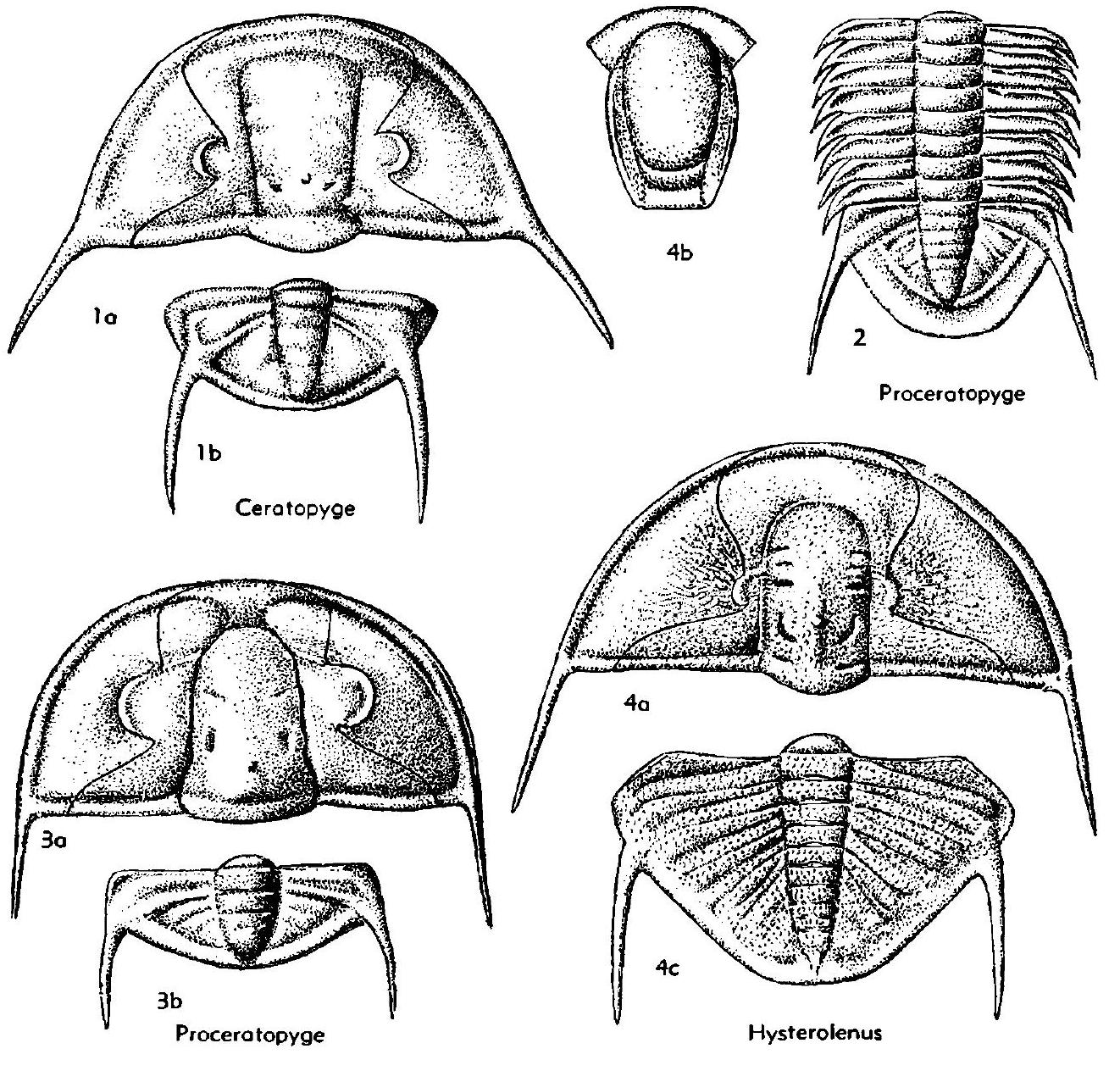Welcome to the Treatise on Invertebrate Paleontology!
Please enter a genera name to retrieve more information.

Ceratopyge
Classification
Phylum:
Arthropoda
Subphylum:
Trilobitomorpha
Class:
Trilobita
Order:
Ptychopariida
Suborder:
Asaphina
Superfamily:
Ceratopygacea
Family:
Ceratopygidae
Formal Genus Name and Reference:
Ceratopyge Hawle & Corda, 1847
Type Species:
Olenus forficula SARS, 1835
Images
(Click to enlarge in a new window)
Fig. 271, 1. *C. forficula (Sars), Swed., la, b, ceph., pyg., x2.8 (153)"
Synonyms
Geographic Distribution
Norway, Swed., Arg.
Age Range
Beginning Stage in Treatise Usage:
L.Ord.(Tremadoc)
Beginning International Stage:
Tremadocian
Fraction Up In Beginning Stage:
0
Beginning Date:
486.85
Ending Stage in Treatise Usage:
L.Ord.(Tremadoc)
Ending International Stage:
Tremadocian
Fraction Up In Ending Stage:
100
Ending Date:
477.08
Description
"Cephalon slightly less than 0.5 of total length, cranidium narrow, glabella slender, slightly expanding forward, truncate in front, occipital furrow strongly impressed, preoccipital lateral glabellar furrows pit-shaped, strongly impressed, other glabellar furrows shallow, almost effaced, palpebral region of fixigenae narrow, palpebral lobes short, strongly curved, situated a little posterior to glabellar center, anterior sections of facial sutures strongly diverging between eyes and anterior border, forming angles of about 90^{\\circ} with posterior sections. Thorax of 6 segments with narrow axis, straight, deeply furrowed pleurae with pointed, outward-directed ends. Pygidium semicircular, somewhat smaller than cephalon, with very narrow, slightly convex border, 5 or 6 axial rings, 2 anterior segments perceptible in pleural fields, and a pair of backward-directed, gently curved spines formed by coalescence of distal parts of 1st and 2nd segment (153)."
References
Museum or Author Information
Classification
Phylum:
Arthropoda
Subphylum:
Trilobitomorpha
Class:
Trilobita
Order:
Ptychopariida
Suborder:
Asaphina
Superfamily:
Ceratopygacea
Family:
Ceratopygidae
Formal Genus Name and Reference:
Ceratopyge Hawle & Corda, 1847
Type Species:
Olenus forficula SARS, 1835
Images
(Click to enlarge in a new window)
Fig. 271, 1. *C. forficula (Sars), Swed., la, b, ceph., pyg., x2.8 (153)"
Synonyms
Geographic Distribution
Norway, Swed., Arg.
Age Range
Beginning Stage in Treatise Usage:
L.Ord.(Tremadoc)
Beginning International Stage:
Tremadocian
Fraction Up In Beginning Stage:
0
Beginning Date:
486.85
Ending Stage in Treatise Usage:
L.Ord.(Tremadoc)
Ending International Stage:
Tremadocian
Fraction Up In Ending Stage:
100
Ending Date:
477.08
Description
"Cephalon slightly less than 0.5 of total length, cranidium narrow, glabella slender, slightly expanding forward, truncate in front, occipital furrow strongly impressed, preoccipital lateral glabellar furrows pit-shaped, strongly impressed, other glabellar furrows shallow, almost effaced, palpebral region of fixigenae narrow, palpebral lobes short, strongly curved, situated a little posterior to glabellar center, anterior sections of facial sutures strongly diverging between eyes and anterior border, forming angles of about 90^{\\circ} with posterior sections. Thorax of 6 segments with narrow axis, straight, deeply furrowed pleurae with pointed, outward-directed ends. Pygidium semicircular, somewhat smaller than cephalon, with very narrow, slightly convex border, 5 or 6 axial rings, 2 anterior segments perceptible in pleural fields, and a pair of backward-directed, gently curved spines formed by coalescence of distal parts of 1st and 2nd segment (153)."
